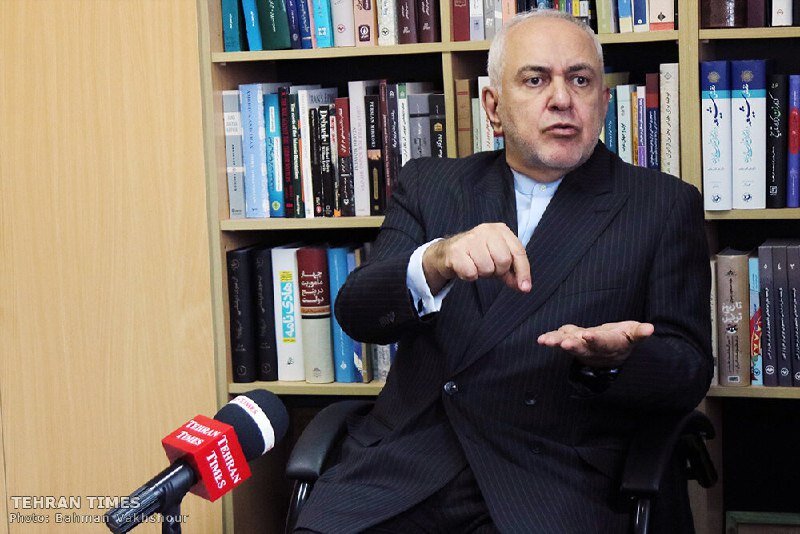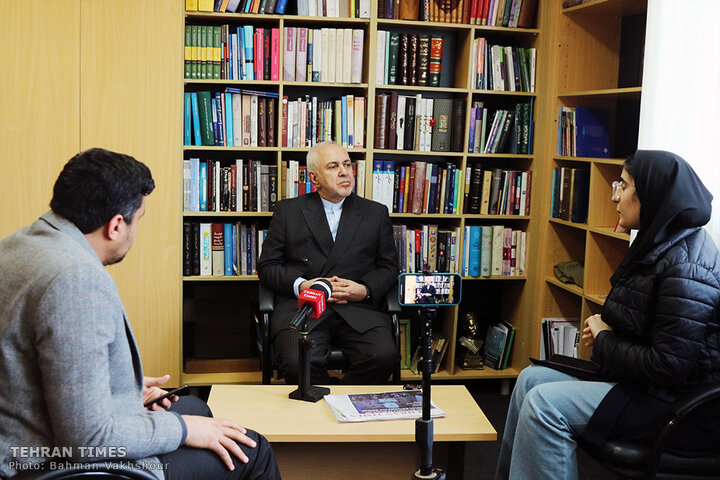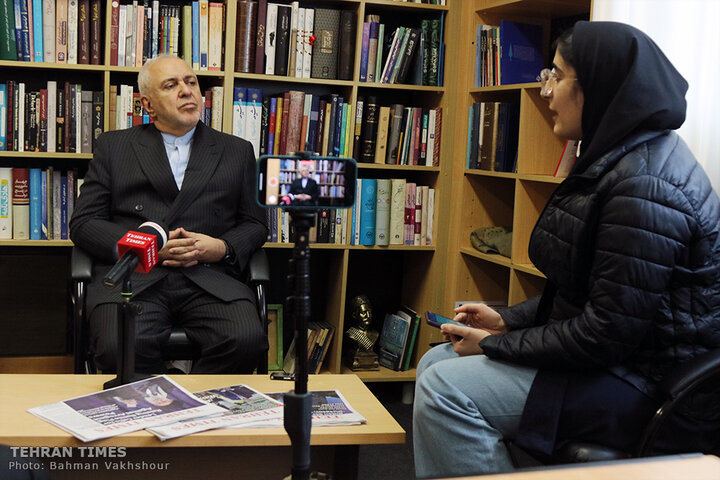Israel can defeat Arab armies but not Arab resistance

TEHRAN – During an exclusive interview with the Tehran Times, former Iranian Foreign Minister Mohammad Javad Zarif highlighted that Israel’s ongoing deadly campaign in Gaza though disastrous, is completely futile.
He emphasized that the regime’s attempts to regain its myth of invincibility are doomed to fail as it would not be able to defeat resistance forces anywhere in the region.
The full text of the interview can be read below:
Q: I want to start the interview with what’s front and center nowadays. After Israel launched its genocidal attacks on Gaza the two-state solution once again began to gain recognition. Washington, in particular, has revisited the idea multiple times. Do you think the two-state solution is the answer considering that it has failed to come to fruition for the past several decades?
A: I think the biggest obstacle to the realization of the two-state solution has been and will always be Israel. Netanyahu and the right-wing hardline politicians in Israel are more difficult, but it doesn't mean that the rest of Israel’s political scene is willing to let a Palestinian state be formed. We are talking about a Palestinian state with what has been internationally recognized as Al-Quds being its capital, being a viable state, a continuous state, a contiguous state. That is not acceptable to any of the various Israeli political ideologies that are represented in the Israeli establishment. We've seen that the Oslo and Madrid Accords were a preliminary step to a real two-state solution based on the agreement between the late Chairman Arafat and the Israelis. However, as we proceeded to Camp David in 2000, we saw that the Israelis were not prepared to offer anything beyond that preliminary stage. And that preliminary stage is Gaza plus small pockets of the Palestinian population in the West Bank which are surrounded by Israelis. The Palestinian regions cannot be connected to each other and people need to get through bans and Israeli checkpoints throughout these lands. That is what they call a two-state; they do not want to resolve the issue with al-Quds and they do not want to include millions of Palestinian refugees that have been driven out of their homes. So, the two-state solution as the international community understands it and the two-state solution as the more so-called peaceful elements in Israel understand it are totally two different things. Therefore, I have to say that the most serious obstacle to a Palestinian state within a two-state solution has been and will continue to be the Israeli regime, regardless of its color or inclination.
Q: But Israelis do not seem to be willing to let Palestinians have even that shell of the state anymore. Am I right?
A: No, no, no. They're not. Netanyahu and the more right-wing elements within the Israeli establishment are not prepared to entertain that idea. And if you look at the map that Netanyahu showed in front of the UN General Assembly just before October 7th, you see that on that map there was no Palestine. The expansionist aspirations of the Zionist ideology were clearly shown in the map that Netanyahu presented to the General Assembly. And nobody raised an eyebrow in the international community to that aggressive policy that basically destroyed the entire concept of a two-state solution from the international community's point of view.
A: I think you need to look at this issue from two different angles. First, European and Western governments’ claims to support human rights and stand for international law, particularly International Humanitarian Law, have proven to be bogus because of the way they dealt with Israel’s latest war against the Palestinians at least in the first few weeks after October 7th. They continue to support Israel and they continue to prevent an end to its acts of genocide and crimes against humanity. They support the regime politically and also by sending it the weapons it needs to conduct these massive atrocities.
Western public opinion, however, is different. Israel was capable of directing and impacting Western public opinion for the first few days after the October 7th operations in the occupied territories. But following Israeli massacres, particularly after the indiscriminate killing of innocent people in the hospitals, that image of Israeli victimization was shattered. Israel cannot control public opinion anymore and I think people in Western societies are now pressuring their governments.

The Israeli foreign policy has always had two pillars: victimization and invincibility. I think both of these two pillars have been shattered and crushed, after October 7th. Israel showed that it had been able to defeat Arab armies, but it was not capable of defeating Arab resistance. Now, resistance has proven that Israel's myth of invincibility is no longer valid. It may have been valid until 1978 and 1982 when they invaded and occupied Lebanon, but not anymore.
The inhumanity and savagery Israel has been showing in Gaza in the past five months are simply a defeated approach. The pillar of victimization on which Israel has based its existence is gone following its genocide. Now, even the Jewish population in the United States is rising against these real atrocities.
Q: You said the public is currently pressuring Western governments. Do you think domestic pressure is going to force these states to change their behavior?
A: I don't think they will change their actual behavior, but at least they will change the facade. They will change their slogans. That’s why we hear Kamala Harris talking about the need to stop Israel. We also hear some Western European leaders talking about the need to end even the supply of weapons to Israel. You heard Borrell saying that if you want an end to the war, end sending Israel the means of conducting the war. So, you will hear more of these statements, but we cannot say that there will be a change in Western policies.
Q: Islamic countries are being accused of inaction against Israeli crimes. Several Arab states as well as Turkey have refused to tighten the grip on Israel and are still in touch with the regime. What is your take on this? Do you think this sort of double action by regional countries can lead to a public furor?
A: I think the Arab public opinion is no longer fooled by the narrative that Israel and some Arab states have been trying to push in the past years. People know that the real threat comes from Israel despite attempts to portray Iran as the threat. That misperception has been shattered and destroyed by the war in Gaza.
Arabs can tell that their governments are cooperating with Israel or have at least kept silent about its crimes. So, once again, Arab public opinion has to be differentiated from the Arab rulers. People are not fond of Israel and they do not want to see the continuation of normalization deals with the regime.
I think it is important to make sure that Arab and Islamic governments also live up to what they say publicly and prevent the type of behind-the-scenes strategies that are being pursued by the United States in order to recreate that coalition with Israel and Arab states. I think that would be fundamentally flawed and dangerous for the entire Arab world and would be a betrayal of the cause of Palestine and a betrayal of all these tens of thousands of people who have martyred in Gaza.
A: I think this is more of a diplomatic maneuver by Saudi Arabia to put the Israelis in the corner. But if that eventuality was to take place, I think that would be a betrayal of the cause of Palestine. And I hope the Saudis, under these circumstances, would not dare take that step, particularly because of the public opinion of the Arab and Islamic world.
Even if Saudi Arabia and other Arab states want a two-state solution, now is the time to make sure a viable Palestinian state will be formed. But once again, I'm sure Israel will never accept that.

Q: A few weeks ago, Meta removed the Leader of the Islamic Revolution’s accounts on Instagram and Facebook for supporting the Palestinian resistance. How do you think this move speaks to Western countries' proclamations on freedom of speech?
A: I think that the statements and claims about freedom of speech and freedom of expression were, more often than not, attempts to impose certain political inclinations. The degree of tolerance for supporting Palestine within the establishment in the United States was basically examined by the way they treated the presidents of various universities who allowed support for the Palestinians. They created all sorts of public relations campaigns against these figures, to the point that the president of Harvard had to step down. The West exercises various means of limiting freedom of expression and freedom of speech while continuing to claim that it supports them. So, for those of us who have been exposed to Western universities and Western societies, we know that while there is a degree of freedom of expression, when it comes to areas that the governments feel are explicitly running against their perceived vital interests, then they define a limit. I remember one of the complaints that Pompeo had about my presence in the United States was that I was being interviewed by the American press. and one of the reasons they designated me and put sanctions on me was not to be able to communicate with the American people through American media.
A: The reason for the reaction of the West was that they could not tolerate the fact that China was playing a major role in this rapprochement between Iran and Saudi Arabia, because they believe that they are the center of the universe and they have to be at the center of any negotiations or discussion anywhere in the world. So, they found it difficult to digest the fact that someone outside the West was doing this. This is exactly what happened with the Astana process. When Iran, Russia, and Turkey were able to put an end to the conflict in Syria, nobody wanted to believe it, and everybody was predicting the failure of the Astana process. I remember vividly how the West was ridiculing the Astana process. I think the same applies to the rapprochement between Iran and Saudi Arabia through China.
Q: Have Iran and Saudi Arabia moved towards a full détente?
A: There were expectations about the relations between Iran and Saudi Arabia. Not all those expectations have been met, But I think the fact that Iran and Saudi Arabia are now on talking terms and are consulting each other about international issues is important. I believe Saudi Arabia has to perform better and do more in order to be in line with the rest of the Muslim and Arab world in dealing with important issues like Gaza.
Q: Let’s talk a bit about the JCPOA. What’s new on this?
A: I'm not privy to the information about negotiations, but I think there were erroneous predictions by both sides. The Iranian side believed a harsh winter was coming, and the Western side believed that the situation during the last fall would lead to a very weak government in Iran or even the overthrow of the government. Both predictions have proven false, and we lost major opportunities. So, I think it's better to put wishes and illusions aside and deal with realities and if we deal with realities, I think everybody will find out that the JCPOA is the best solution to the nuclear crisis.
Q: Do you think there are still opportunities to come?
A: Yes, I believe we make opportunities. I do not believe human beings are imprisoned by geostrategic conditions. So, I think if governments decide to take the right course, there's still room open for the right course to be taken.
Q: We will now move to the war in Ukraine. The Ukraine war has increased Europe’s dependency on Washington. Does that augur bad for ties between Iran and Europe?
A: I think Ukraine was a securitization trap laid by the United States against Russia. the U.S. entrapped Russia in order to reestablish its centrality for European security. I think Europe is the major loser in this and Ukraine was the ultimate victim.
Washington wanted to trap Russia by sacrificing Ukraine and restore European security dependence on the United States. And to some extent, it has succeeded.
In my opinion, Iran is an independent player in this. We should not allow the securitization of Russia to include Iran. We are friends with Russia, but Russia does not participate when Iran is being securitized, so we do not want to fall victim to the securitization of Russia. We have to manage our relations with Europe and Europe will see that it is in its interest to have reasonable relations with Iran. I'm not talking about fantastic relations between Iran and Europe, but it's in the interest of both Iran and Europe to have reasonable ties.
Q: What is your assessment of the 2024 U.S. elections, and do you think Biden has a better chance of winning than Trump?
A: I don't think we can tell who's going to be the president. We should not discount either of the two candidates or maybe a third candidate emerging in the future. We are still several months away from the U.S. elections and a lot of things can happen during this period.
Right now, there is the possibility that Trump will regain the White House though we should not consider it certain. Biden still has a lot of capabilities, and incumbency is his greatest asset. Of course, his politics in Gaza has destroyed part of its base, which brought him to office in 2020. He has understood that and seems to be trying to repair it.
But the reality is that both Trump and Biden have a reasonable chance of being in the White House next January.
A: I don't agree with the assessment that both Trump and Biden dealt with JCPOA in the same way. But I also believe that if Trump were to come to the White House, Iran would see more difficult days, particularly in light of what has happened in the last three years of the Biden administration and the closer cooperation between Europe and the United States, something that we did not have during the first Trump administration. This time would be different. So, we need to keep that in mind. But also, I believe Iran is an important player, and Iran will determine its future by its own actions. We're not a subject of what happens in Washington. We are ourselves a player that has a role in not only what happens in our region, but even beyond the region.
Q: My last question for you is about the 25-year cooperation agreement between Iran and China which was inked during your tenure as the foreign minister. There has not been much information on the agreement. Can you please give us more details and explain what has been implemented so far?
A: China never publicizes its bilateral agreements and it wanted us to respect that. This is a bilateral agreement and we could not have acted unilaterally. But what I can tell you is that it wasn’t a contract or treaty. It was a roadmap, a roadmap that showed that Iran and China wanted to continue to cooperate in certain fields for the next 25 years. We simply specified the areas in which we wanted to cooperate, like in the Belt and Road Initiative, in high technology, in the reconstruction of the Gulf of Oman, and investments in some Iranian industries.
There were no commitments and Iran did not allocate any sector to the Chinese despite what was said back then in the media.
I don't know how much of it has been implemented but I can say that it opened countless possibilities to both sides. And I know that if implemented, the 25-year cooperation agreement will be in the interest of both Iran and China as well as the region, and international peace and security.
By Mona Hojat Ansari
Culled from Tehran Times

